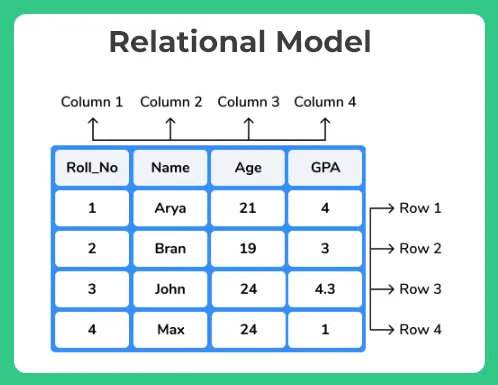Relational Model in DBMS
Relational Model
In a database management system (DBMS), the relational model is a way of organizing data into a collection of tables, called relations, that have a specific structure and can be related to each other through common columns called keys.
Relational model in DBMS
In this article, we will learn about Relational Model in DBMS.
Relational modelwas first outlined by EF Codd in 1970 and since then it was the most widely used data model and in fact, the only used database management system today in the world- The basic idea between this relational data model is simple two-dimensional tables, also called relations which consist of rows and columns.
Main components of the relational model
- Rows and columns of tables
- Operations on these rows and columns manipulating required data

Example:
Student table consists of different types of data like student name, marks, and age, etc and all these details are stored in separate columns where each individual student details is stored in a separate row in the table.
Advantages of the relational model
- Data integrity for accuracy and consistency
- No data redundancy
- Access control and integrity in the form of constraints which enables validation before entering and accessing the data
- Provides high security
- Supports to store any type any data types(numbers, characters, date, images, audios, text files )
- Data can be managed and used by several users at a time.
- Data can be shared across several platforms.
Note:
Oracle 10g a most popularly used RDBMS is proven to be the fastest database for transaction processing including data warehousing and third-party application on several servers of all sizes.
Learn about other Data Models here on this page.
Prime Course Trailer
Related Banners
Get PrepInsta Prime & get Access to all 200+ courses offered by PrepInsta in One Subscription
Get over 200+ course One Subscription
Courses like AI/ML, Cloud Computing, Ethical Hacking, C, C++, Java, Python, DSA (All Languages), Competitive Coding (All Languages), TCS, Infosys, Wipro, Amazon, DBMS, SQL and others






Login/Signup to comment